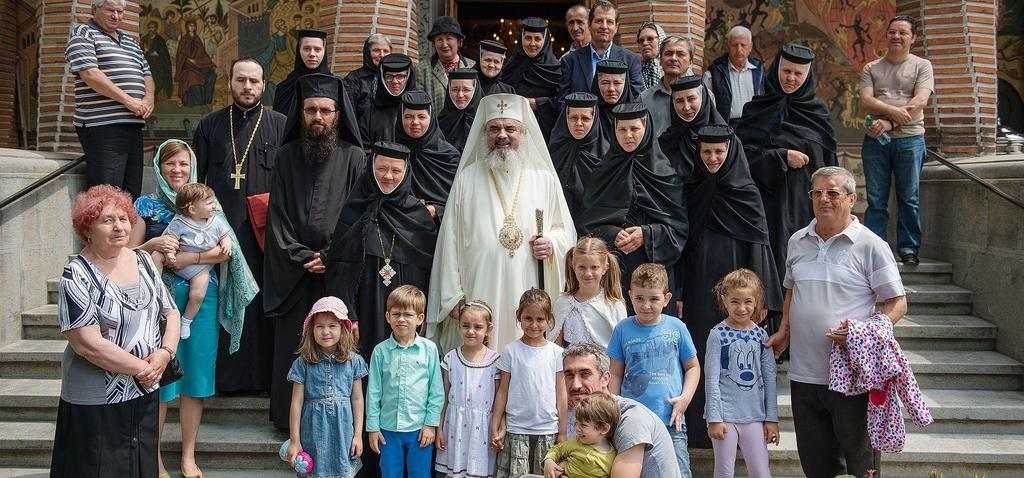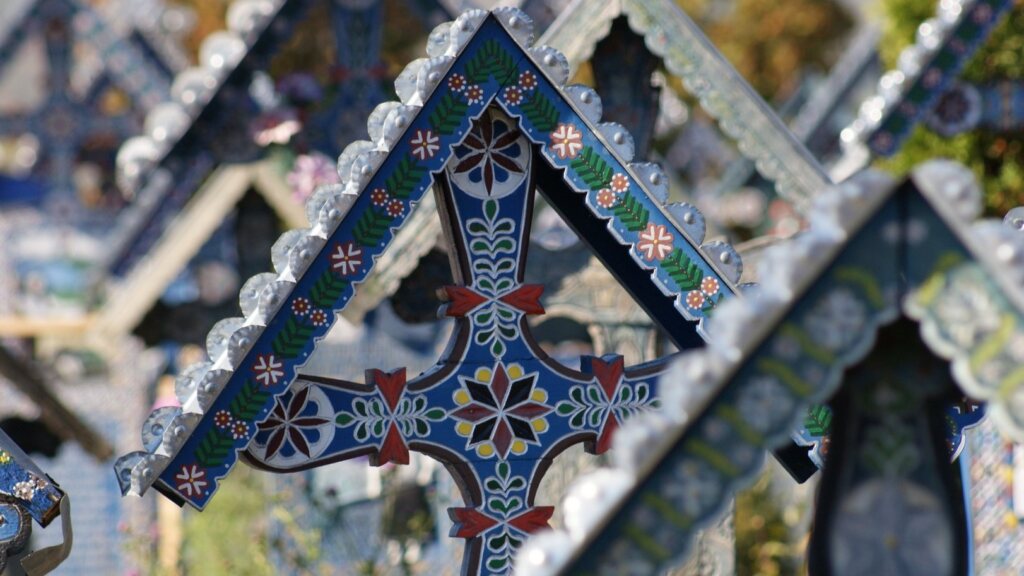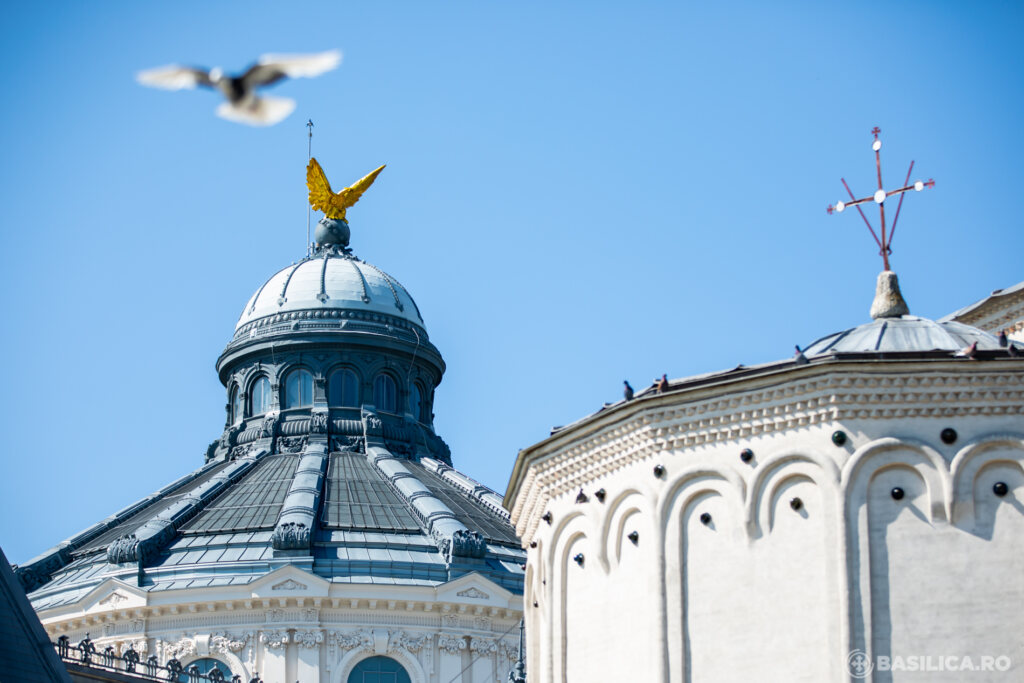Today, 17 May 2015, the 6th Sunday after Easter, also called of the Born blind man, His Beatitude Daniel, Patriarch of the Romanian Orthodox Church visited the monastic community of Samurcasesti Monastery, in Ciorogarla locality, county of Ilfov, where he participated in the Divine Liturgy.
To end with the celebration, the Patriarch of Romania delivered a sermon in which he spoke about the spiritual teaching of the Evangelical pericope of the Holy Gospel according to John 9:1-38, read today during the Divine Liturgy in all the places of worship: “The first work of God which allows somebody to be born blind is to show the people who have eyes and can see that eyesight is a gift of God. It is not an obligation or right, but a gift. You can be born with eyesight or blind, in good health or not. Thus, the good health and integrity of the body and of the soul are gifts, not rights from God”.
“The second work of God, when He allows such cases, is to make us help the persons with eyesight, hearing or locomotor deficiencies. The gospel writes that this blind man lived from begging because he could not earn what he needed. Whoever helped him was rewarded by God because he was merciful to a helpless man”, His Beatitude said.
His Beatitude Patriarch Daniel has also shown that the born blind man received from God besides his eyesight the gift of spiritual eyesight, which is the faith: “In this case, the work of God can be seen in this man in two ways: first, he was healed of the blindness of his physical eyes; secondly, because besides his eyesight he has also received the spiritual sight, which is the faith. Having been healed of his blindness he understood that a divine power worked through Jesus-the-Man who healed him. Then, he believed that Jesus is not only a prophet, but also the Son of God. That is why he said: “Lord, I believe. And he worshipped him.”. Thus, the work of God could be seen in the healing of the physical blindness as well as in the spiritual illumination after giving the spiritual eyesight beyond the visible things, namely the sight of faith which feels the presence and work of God in the life of man and in the world.”
Then, His Beatitude Daniel showed why the Saviour needed to mix saliva from His mouth with the dust of the road: “Here is a very great mystery, namely, the same as He bowed down, took earth or clay, mixed it with Holy Spirit, blew over it and created man when He said: “Let us make humankind in our image, according to our likeness” so does God bow down and mix the saliva with dust and spreads it on the eyes of the born blind man, who could not see, and re-creates his eyes. Then, He tells him: “Go wash in the pool of Siloam”, but that pool had no miraculous water, because had it been so his parents or neighbours would have taken him there to be healed and Jesus’ intervention would not have been necessary.”
The born blind man was sent to wash at the pool of Siloam for two reasons: “First to show that this born blind man was more obedient and faithful than the Pharisees who did not obey Jesus, although they could see His wonders, but did not believe in Him. He sent him to wash at the pool of Siloam after He spread mud on his eyes. Thus, the blind man obeyed Jesus and believed that he would be healed. He obeyed without asking anything else. Who took him to the pool? The Holy Gospel does not say that. We do not know if his parents or neighbours took him there. We rather know that he went to the pool all by himself led by the power of the guiding healing Word of Jesus Christ, our Saviour. The second reason was that more people had to see that he was blind. When he went to the pool with his eyes covered with mud the same crowd saw that he was blind. Thus, it was a way of showing his state of sickness and healing, of confessing the wonder made by Jesus Christ who healed him.”, His Beatitude said.
To end with his speech, the Patriarch of Romania urged the faithful to strengthen themselves in faith answering the love of God with prayer and good deeds: “The Gospel on the healing of the born blind man is a Gospel of the merciful love which makes good out of his own will as well as the Gospel which shows us how big the gift of sight is, not only of the physical sight, but also of the spiritual sight, which is the gift of faith. Today, the lack of faith as spiritual incapacity of some people to believe in God the Creator of the Universe and of man, fully revealed to the world in and through Jesus Christ, is manifested in several forms: atheism or hostility towards religion, nihilism or indifference towards the values of faith, secularisation or diminishing of the spiritual life, of prayer. The secularised man is the man who does no longer pray, even if he thinks he is religious. This state of spiritual weakness goes up to forgetting about God and Church. Rather often, the people who passed through sufferance and felt the help of God as healing of sickness and rid of sins increase faith as spiritual sight of the presence and work of God in the human life. This is why we must not wait to pass through diseases or troubles to increase our faith, but only answer the great love of God who gave us life and helps us save ourselves with our love. How do we answer? It is through prayer and good deeds”.
To end with, the Patriarch of Romania offered Samurcasesti Monastery several liturgical books as a sign of appreciation and blessing.






